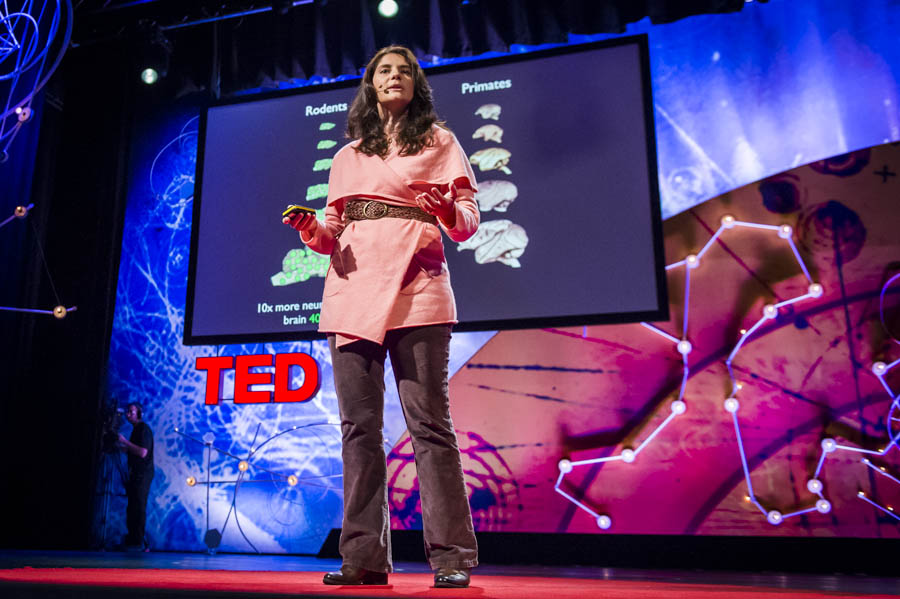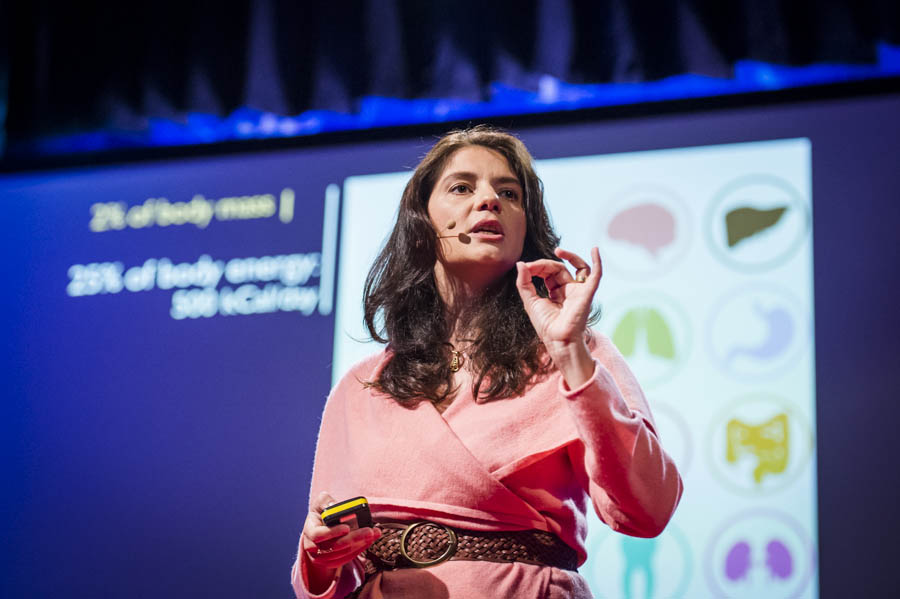For decades, scientists said that the human brain contains 100 billion neurons. However, when neuroscientist Suzana Herculano-Houzel hunted for the source of this often-quoted number, she couldn’t locate one. So she set out to count herself … by making brain soup.
She brings a vial of brain soup with her onto the TEDGlobal 2013 stage. This substance was made by dissolving donated brains, destroying the cell membranes but leaving the nuclei intact. This made a homogenous mixture that allowed her to count the neurons in a sample. As it turns out, the human brain really has 86 billion neurons.
Why does this difference of 14 billion neurons matter? It answers a vital question: What makes the human brain different, allowing us to get together for thought-fests like TEDGlobal 2013, while other animals don’t?
For a long time, scientists thought that all mammal brains were made of the same material. But if that were true, then mammals with larger brains would be the most cognitively able. That simply isn’t true. Plus, human brains reveal a few oddities. For instance, Herculano-Houzel says, we have a larger cerebral cortex than it seems like we should have, given the size of our bodies. Meanwhile, human brains use a tremendous amount of energy. While the brain is 2% of the body, it uses 25% of the calories we need to function each day. Why should the rules of evolution not apply to humans?
This brings us back to Herculano-Houzel’s finding that the human brain actually contains 86 billion neurons. The new baseline allowed her lab to do comparisons to other animal brains. And they found that human brains are proportional in terms of the number of neurons and energy use to other primate brains — they are just larger. “It’s a great reminder of our place in evolution,” says Herculano-Houzel.
Which still leaves the question: Why would we have a larger brain than a great ape that has a much larger body? The answer comes down to the extreme energy cost of the primate brain. There appears to be some kind of evolutionary trade-off between the size of the brain and the size of the body — there’s a metabolic limitation, and primates can only consume enough calories to support one or the other.
So the next logical question is: What allowed us to transcend this limitation and support this large brain? Herculano-Houzel points out that our cerebral cortex is especially dense, containing 16 billion neurons. It takes a lot of energy to support that.
The answer is so simple, it’s something you’ve probably never thought about. Herculano-Houzel states it in two words: We cook. Cooking is essentially the act of using fire to pre-digest food, and thus to get more energy out of the same amount of food. In fact, cooking food makes it yield about three times as many calories. This is what allowed our brains to get bigger in a relatively short period of time while remaining a primate brain. Cooking also allowed us to support this large cerebral cortex, which in turn supports complex thought.
Wrapping it all up, Herculano-Houzel concludes, “I take a look at my kitchen, and I bow down to it.”
She’ll just maybe skip the soup.
Suzana Herculano-Houzel’s talk is now available for viewing. Watch it on TED.com »


Comments (18)
Pingback: Ryzen Pharmaceuticals - Bodybuilding Blog
Pingback: Cocina, cosa de homínidos. Una aproximación evolutiva a nuestra dieta.
Pingback: Lessons from brain soup: Suzana Herculano-Houzel at TEDGlobal 2013 – Signal Surgeon
Pingback: American Steroids Online
Pingback: Cocina, cosa de homínidos. Una aproximación evolutiva a nuestra dieta.
Pingback: Neurocientista pede sua ajuda para grupo de pesquisa não fechar as portas no Brasil | Tech News
Pingback: Pesquisa brasileira descobre a relação entre o tamanho do cérebro e o sono | RemoveWAT SP1
Pingback: Pesquisa brasileira descobre a relação entre o tamanho do cérebro e o sono | Tech News
Pingback: Entrevista: Suzana Herculano-Houzel e os desafios de ser cientista no Brasil | Tech News
Pingback: Entrevista: Suzana Herculano-Houzel e os desafios de ser cientista no Brasil | RemoveWAT SP1
Pingback: Entrevista: Suzana Herculano-Houzel e os desafios de ser cientista no Brasil | Tech Store
Pingback: Entrevista: Suzana Herculano-Houzel e os desafios de ser cientista no Brasil | Blog Sr do Jack
Pingback: Vegan Diets Cannot Save the Planet | Display Adaptability
Pingback: TEDGlobal 2013 – Day 2 | TEDxNYU
Pingback: In case you missed it: Some highlights of day 2 at TEDGlobal 2013: Think Again | BizBox B2B Social Site